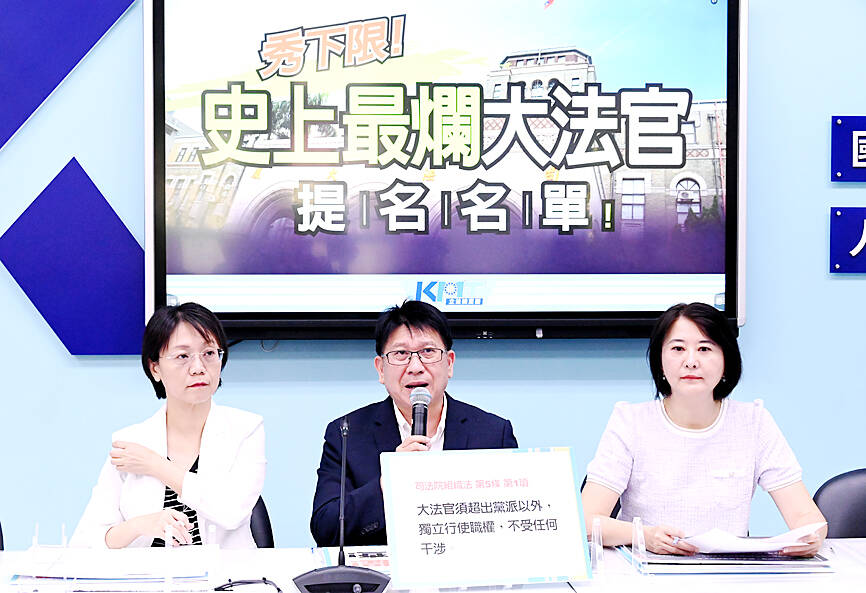The Chinese Nationalist Party (KMT) yesterday criticized President William Lai (賴清德) over his appointees to the Judicial Yuan, saying they were politically motivated.
Vice President Hsiao Bi-khim (蕭美琴) on Friday announced the president’s picks to lead the judicial branch and fill openings on the Constitutional Court after the president, vice president and five justices step down on Oct. 31.
National Taiwan University law professor Chang Wen-chen (張文貞) was named to lead the branch, while Yao Li-ming (姚立明), director of Lai’s presidential campaign headquarters in January’s election, was tapped for the vice presidency.

Photo: Chu Pei-hsiung, Taipei Times
The appointees must be confirmed by the legislature.
At a news conference yesterday, the KMT caucus said all the nominees are affiliated with the Democratic Progressive Party (DPP).
Chang last month argued to the Constitutional Court that the process by which controversial legislative reform bills were passed earlier this year contained “manifest and gross procedural flaws” and should be ruled unconstitutional.
Meanwhile, Yao’s “only achievement” was leading Lai to electoral victory in January, the KMT said.
Yao from 1996 to 1999 served as a lawmaker with the New Party, a KMT splinter party favoring closer ties with China, and was the campaign head for Taiwan People’s Party Chairman Ko Wen-je (柯文哲) when he ran as an independent for Taipei mayor in 2014.
Lai chose “henchmen” rather than justices who are looking to uphold the Constitution, the caucus said, adding that it cannot accept the nominations.
Taiwanese are worried about the neutrality of the judiciary, especially the Constitutional Court, KMT caucus secretary-general Lin Szu-ming (林思銘) said.
One of the nominees to the court — Academia Sinica professor Fort Liao (廖福特) — is a member of the DPP’s arbitration committee and was an expert witness against renewing CTi News’ license, Lin said.
Another justice nominee — Academia Sinica research professor Liu Ching-yi (劉靜怡) — was an expert witness on the DPP’s side in a case on the constitutionality of the Act Governing the Settlement of Ill-gotten Properties by Political Parties and Their Affiliate Organizations (政黨及其附隨組織不當取得財產處理條例), he said.
The court is set to decide a major case on the death penalty, KMT caucus deputy secretary-general Wang Hung-wei (王鴻薇) said.
Of the 15 current justices, nine have expressed a preference to abolish the death penalty, she said, adding that of the seven nominees, six have advocated for its abolishment.
In response, the Presidential Office yesterday said that all seven nominees have deep legal knowledge and a progressive outlook, urging the opposition to review their cases rationally.
The nominees were chosen because they are professional, progressive and have an internationalized perspective with practical experience in balancing legal theory and the practice of law, Presidential Office spokesperson Karen Kuo (郭雅慧) said.
Additional reporting by Chen Yun and CNA

Beijing could eventually see a full amphibious invasion of Taiwan as the only "prudent" way to bring about unification, the US Department of Defense said in a newly released annual report to Congress. The Pentagon's "Annual Report to Congress: Military and Security Developments Involving the People's Republic of China 2025," was in many ways similar to last year’s report but reorganized the analysis of the options China has to take over Taiwan. Generally, according to the report, Chinese leaders view the People's Liberation Army's (PLA) capabilities for a Taiwan campaign as improving, but they remain uncertain about its readiness to successfully seize

Taiwan is getting a day off on Christmas for the first time in 25 years. The change comes after opposition parties passed a law earlier this year to add or restore five public holidays, including Constitution Day, which falls on today, Dec. 25. The day marks the 1947 adoption of the constitution of the Republic of China, as the government in Taipei is formally known. Back then the Chinese Nationalist Party (KMT) governed China from Nanjing. When the KMT, now an opposition party in Taiwan, passed the legislation on holidays, it said that they would help “commemorate the history of national development.” That

Taiwan has overtaken South Korea this year in per capita income for the first time in 23 years, IMF data showed. Per capita income is a nation’s GDP divided by the total population, used to compare average wealth levels across countries. Taiwan also beat Japan this year on per capita income, after surpassing it for the first time last year, US magazine Newsweek reported yesterday. Across Asia, Taiwan ranked fourth for per capita income at US$37,827 this year due to sustained economic growth, the report said. In the top three spots were Singapore, Macau and Hong Kong, it said. South

Snow fell on Yushan (Jade Mountain, 玉山) yesterday morning as a continental cold air mass sent temperatures below freezing on Taiwan’s tallest peak, the Central Weather Administration (CWA) said. Snowflakes were seen on Yushan’s north peak from 6:28am to 6:38am, but they did not fully cover the ground and no accumulation was recorded, the CWA said. As of 7:42am, the lowest temperature recorded across Taiwan was minus-5.5°C at Yushan’s Fengkou observatory and minus-4.7°C at the Yushan observatory, CWA data showed. On Hehuanshan (合歡山) in Nantou County, a low of 1.3°C was recorded at 6:39pm, when ice pellets fell at Songsyue Lodge (松雪樓), a